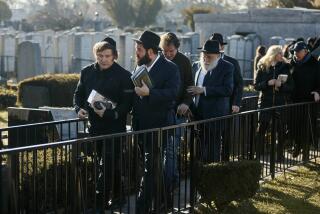Cured, but his calling delayed
- Share via
In JUNE 2005, Yosef Eliezrie was 19, a rabbinical student in New Jersey. He had just arrived in Vilna, Lithuania, on a student outreach program in which one of his responsibilities was to be supervising a kosher kitchen. Cancer was the last thing on his mind. He was going to finish school and follow in his father’s footsteps as a rabbi. Down the road, he was going to fall in love, marry and have a great big family.
“At 19, you think you own the world,” he says. “You think you have the whole thing planned.” But a nagging cough worsened on his arrival in Eastern Europe. He was too weak to get out of bed, and couldn’t keep food down. A flurry of medical tests revealed he had acute myelogenous leukemia, a fast-growing blood and bone marrow cancer. Within a week, he was in a hospital at UC Irvine Medical Center, near his parents’ Yorba Linda home, drugged unaware. “I don’t remember it,” he says.
He knows there were rounds of chemotherapy, 13 days in the intensive care unit including nine days on life support, the gathering of his family in prayer at his bedside. Then there was gradual improvement, peppered with setbacks. “It’s a real quick aging process,” he says. “I learned how fragile life was.”
In April 2006, he was in remission but barely had time to reevaluate his future when cancer came roaring back. He had found an online community of young adult cancer patients and survivors, and logged onto grouploop.org, typing, “HELP. I DON’T KNOW WHAT TO DO.” “They gave me strength,” he says of his online friends. That summer, he had a transplant with bone marrow from a young Israeli man, also a rabbinical student. “He is some sort of angel,” Eliezrie says of this man.
So now, life goes on again. Only it’s vastly different. “You’re forced to go home and be taken care of by your parents, but you want your independence. It’s a very difficult struggle,” he says. Until he was 21, he qualified for the California children’s health insurance program. He aged out of that plan, but qualified for MediCal. He dreams of continuing school in the New York area but doesn’t know if he would continue to qualify for health insurance. “Right now, I’m not free to go where I want to go.”
Nor does he know how a woman he might love will react to his history. “It’s not an easy question,” he says. “According to Orthodox tradition, you go out with someone to get married. I think I will talk about it after I know she’s serious, when I know it’s somebody I can trust and I would maybe want to spend my life with. After a few dates, maybe I would start talking.”
-- Susan Brink
More to Read
Sign up for Essential California
The most important California stories and recommendations in your inbox every morning.
You may occasionally receive promotional content from the Los Angeles Times.













